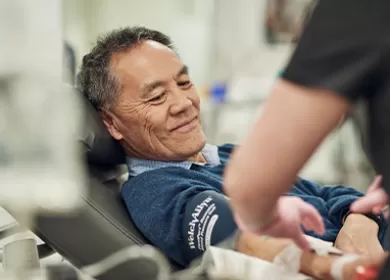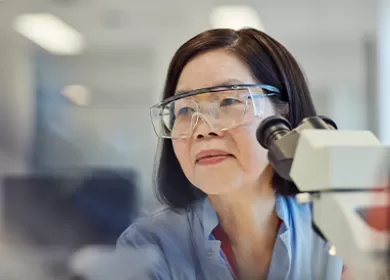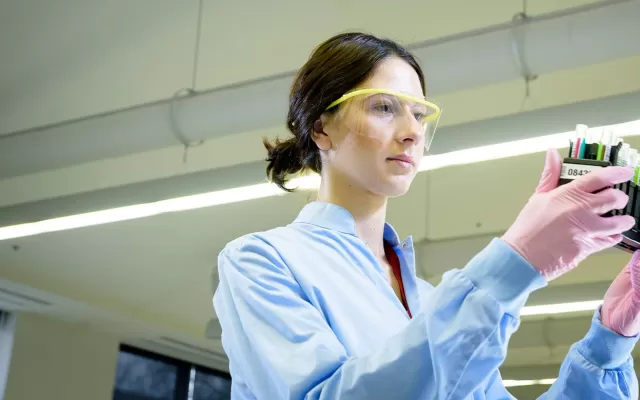What happens to my red blood cells?
White cells are removed
They go through a process called ‘leucodepletion’.
It basically means they’re filtered to remove as many of the white cells as possible, which reduces the risk of transfusion-related reactions.
Before they go to a patient, sometimes they’re washed. That means we remove a lot of plasma proteins, including antibodies.
We only do this if a doctor requests it, because it takes us longer and shortens the shelf-life of the blood. We wouldn’t want to be forced to throw any valuable donations away.
Washed red blood cells usually go to people:
- with a history of severe reactions to transfusion
- who have had severe allergic reactions where the cause is unknown, and
- who react to transfused plasma proteins, like those with a deficiency of a certain type of antibody (protein) in their blood called IgA.
That is, deliberately exposed to radiation. Why would we do that?
Well, irradiated blood products can help prevent transfusion-associated graft-versus host disease (TA-GvHD).
This happens when transfused white blood cells see the patient as foreign and attack their cells. It’s really serious, and can even lead to death.
Irradiation doesn’t remove the white cells, but it stops them from multiplying, which stops the disease.
Irradiated products usually go to people who have a weakened immune system, which could be caused by an immune disease or disorder, cancer, a bone marrow or stem cell transplant, or even being an unborn baby with no immune system yet.
What about my plasma?
Even if you didn’t donate plasma by itself, you still actually donated plasma! That’s because your blood is over 50% plasma and we use every drop of your donation.
Your plasma could be used as fresh frozen plasma (FFP) to replace clotting factors, or it could be made into one of 18 different treatments.
The 18 treatments come in a few categories:
- immunoglobulins (used to enhance immune response to disease and treat auto-immunity)
- clotting factors (used to treat haemophilia and other bleeding disorders), or
- albumin (used to treat fluid loss or supplement low albumin levels).
They’re all life-changing treatments. A lot of patients who need plasma say they're exhausted without it, and it helps them live a normal life.
Discover more about the power of plasma, including why it's a game-changer when it comes to donating blood.
And my platelets?
As with plasma, even if you didn’t give platelets by themselves, you gave some in your blood donation.
Like red blood cells, platelets are filtered to remove the white blood cells. Then, they need to be kept moving constantly. We have special equipment that rocks them back and forth — it’s surprisingly soothing to watch!
Platelets are tricky to store for another reason too: they only last 7 days.
That means they don’t sit on our (moving) shelves for long before we send them to hospitals to be used for major surgeries and trauma patients (like those who have been in car accidents, or had another kind of serious accident).
Want to know more about platelets? We've got an overview, just for you.
Know the journey of blood

What happens to donated blood
Find out what happens to the blood you donate, including the steps in the journey and how your blood can change lives.
Know the steps
Blood testing and safety
After you donate, your blood is carefully packed and sent to a processing centre. There, we test your blood so we know it’s safe for a patient.
How blood is tested
View patient stories
Your blood components are sent out to where they’re needed most, saving up to three lives. View stories from those whose lives have changed from your generosity.
View stories

